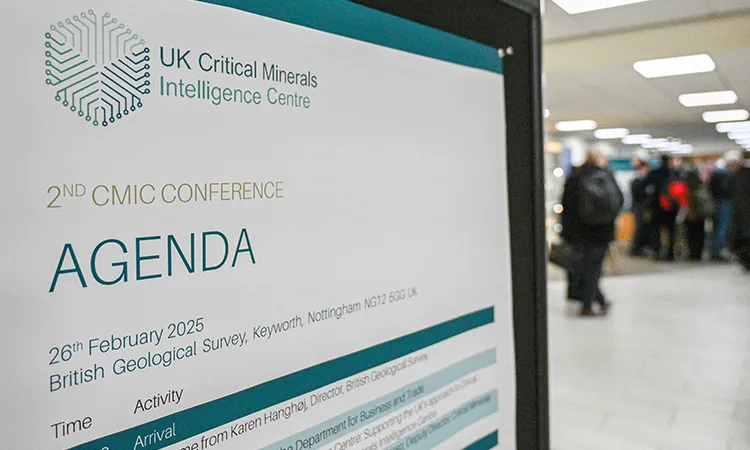Delivering authoritative, impartial and independent up-to-date data, information and analysis on critical minerals that are essential to the UK economy.
The UK Critical Minerals Intelligence Centre (CMIC) supports the UK in securing adequate, timely and sustainable supplies of critical minerals. This ensures the UK can transition its economy in the coming decades to meet challenges such as net-zero emissions, circular economy and a modern industrial strategy.
The UK is leading the way in its decarbonisation efforts, having closed down coal-fired power and transitioning the grid with more renewables (especially wind) and strong progress in electric vehicles. The continued evolution of UK's industrial strategy will require a strong focus on securing supplies of critical minerals, such as lithium, rare earths, gallium, niobium and tungsten (amongst many others). Almost all critical minerals are currently imported, meaning it is important to understand the often complex global supply chains delivering those minerals. The Critical Minerals Intelligence Centre's mission is to analyse those supply chains and provide impartial and objective advice that helps the UK secure sustainable supplies of critical minerals for its various industries.
Led by the British Geological Survey (BGS) with support from the Department for Business & Trade (DBT), we work together with universities and private and public sector partners to gather and analyse intelligence on the supply and demand of critical minerals, their global value chains and use by UK industry. Our aim is to guide decision-making by government and industry to mitigate risks to supply security, helping to deliver economic prosperity and create opportunities for UK businesses in critical mineral supply chains, domestically and internationally.
UK 2024 Criticality Assessment
In November we were delighted to publish the latest UK Criticality Assessment and introduce the report through a live webinar.
News

CMIC hosts second conference
On 27 February 2025, the Critical Minerals Intelligence Centre conference took place at BGS's headquarters in Keyworth, Nottinghamshire.

UK 2024 Criticality Assessment published
The latest assessment is focused on the vulnerability to supply disruption of minerals in an increasingly diversified UK economy.

The challenge of assessing the UK economy's dependence on mineral supply
Critical, essential, or just plain important? Dr Gavin Mudd, director of the Critical Minerals Intelligence Centre, discusses the findings and new methodology featured in the 2024 UK Criticality Assessment.
Centre aims
Minerals and metals perform a myriad of functions, including enabling the technologies needed to mitigate climate change by decarbonising the global economy, such as low carbon energy generation, zero-emission transport and digital systems.
Minerals are likely to assume greater importance in contributing to the UK's economic growth and high standard of living over the coming decades. This will be driven by requirements for the UK to bring all greenhouse gas emissions to net zero by 2050 and strategies to grow the advanced manufacturing sector.
In Net Zero Strategy: Build Back Greener, the UK Government made a public commitment to establish a Critical Minerals Expert Committee to provide independent advice on the scope and content of a UK Government strategy on critical minerals, and create the CMIC to support its delivery. BGS is represented on the Critical Minerals Expert Committee by its director, Karen Hanghøj, and played an instrumental role in developing the CMIC concept.
CMIC was established in April 2022 and launched in July 2022, with the aim of advising government and supporting delivery of the new strategy. The strategy, Resilience for the Future: The United Kingdom's Critical Minerals Strategy was informed by the expert committee and the UK's first criticality assessment that was produced by BGS and was published in June 2022. The strategy sets out the previous UK Government's approach to accelerating growth of the UK's domestic capabilities, collaborating with international partners and enhancing international markets to make them more responsive, transparent and responsible.
In March 2023, the previous Government released an updated strategy, Critical Minerals Refresh: Delivering Resilience in a Changing Global Environment, to reflect the changing global landscape and geopolitical developments. In the refresh, the Government announced that it was establishing an independent Task & Finish Group on Critical Minerals Resilience for UK Industry to investigate the critical mineral dependencies and vulnerabilities across UK industry sectors and opportunities for industry to promote resilience in its supply chains. The group had its first meeting, launched by the business and trade minister Nusrat Ghani, in April 2023 and delivered their independent report to government in December 2024. BGS and CMIC were represented on the group by Andrew Bloodworth.
The CMIC aims to support the UK in securing the adequate and timely supply of the minerals and metals it requires to ensure the success of the net zero transition, mitigate risks to national security, deliver economic prosperity and create opportunities for UK businesses in critical mineral supply chains domestically and internationally. It will provide decision-makers in government and industry with independent, robust, up-to-date and future-orientated analysis and intelligence to manage the dynamic risks associated with the supply and demand of critical minerals.
This includes:
- Accurate, high resolution data and dynamic analysis on primary and secondary minerals resources and stocks and flows of critical minerals in the UK and globally.
- Monitoring mineral market dynamics to understand and identify associated economic, geopolitical, regulatory, environmental and ethical risks and regulatory risks and opportunities.
- Gathering and analysing intelligence on other key factors effecting critical mineral security of supply including environmental, social and governance (ESG) considerations and the developing circular economy.
The British Geological Survey
BGS will be the primary delivery body for the CMIC, drawing on its own expertise, as well as that of universities, research groups and private and public sector (UK and international) partners.
BGS has carried out minerals research to underpin policy-making, regulation and responsible investment in metals and minerals since the 1970s. This includes NERC-funded work on mineral deposit formation, exploration, mineral resources, environmental impact and mining legacy, land-use planning, commodity information, as well as monitoring and analysing production and trade statistics.
BGS is also a long-established world leader in the production of statistical data on the global and UK mineral industries. BGS publications include: World Mineral Production and the UK Minerals Yearbook.
CMIC interactive map
The CMIC interactive map displays a range of new and legacy datasets relevant to understanding the potential opportunities for developing critical mineral value chains in the UK. These include geoscience data that supports the national-scale assessment of the geological potential for critical raw materials in the UK; and the locations of selected mineral processing and refining, chemical and metal production, and recycling operations, and associated development activities.
Contact
For questions regarding the project please email the CMIC (enquire@ukcmic.org).
For media enquiries please email the BGS Press Office (bgspress@bgs.ac.uk) or call the BGS Press Office (+44 (0)7790 607 010). This is a call number only, please do not text.